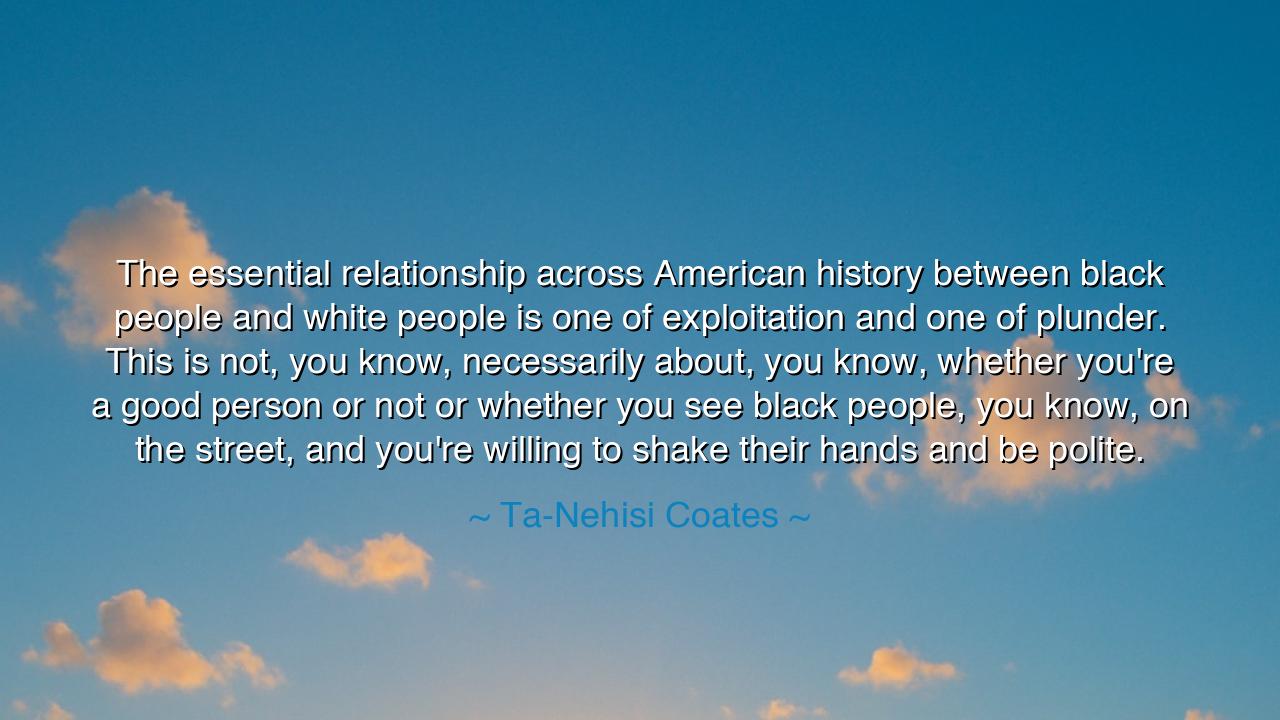
The essential relationship across American history between black
The essential relationship across American history between black people and white people is one of exploitation and one of plunder. This is not, you know, necessarily about, you know, whether you're a good person or not or whether you see black people, you know, on the street, and you're willing to shake their hands and be polite.






“The essential relationship across American history between black people and white people is one of exploitation and one of plunder. This is not, you know, necessarily about, you know, whether you're a good person or not or whether you see black people, you know, on the street, and you're willing to shake their hands and be polite.” Thus spoke Ta-Nehisi Coates, a chronicler of truth and a prophet of remembrance, whose words cut through the veil of comfort to expose the ancient wound that still bleeds beneath the skin of a nation. His voice does not accuse the heart alone but the system that shaped it — the machinery of exploitation and plunder that has, for centuries, consumed black life and labor while clothing itself in the garments of righteousness. His message is not one of hatred, but of illumination — for no wound can heal unless it is first seen in its full, unflinching light.
In the long saga of American history, the bond between black and white was not born of equality, but of power and possession. From the first chains that clinked in the holds of slave ships, through the auction blocks where families were torn apart, to the cotton fields where men and women worked from dawn until stars returned — the foundation of the nation was laid upon the backs of those who were denied their own humanity. Plunder was not only of body, but of soul: generations stripped of name, of language, of future. Coates speaks not to stir guilt, but to awaken memory — to remind a people that what was built on injustice cannot stand until it is reckoned with in truth.
And yet, as he says, this is not about being good or bad. Morality, as it is practiced in daily gestures — the handshake, the smile, the polite nod — cannot wash away the debt of centuries. For the evil Coates names is not the cruelty of individual hearts alone; it is the design of a world that made cruelty seem ordinary. It is the quiet evil of laws and ledgers, of neighborhoods divided and opportunities stolen. The relationship of exploitation is not a single act, but a long inheritance, passed down through the hands of history, disguised as progress, sustained by forgetting.
Think of the story of Black Wall Street in Tulsa, Oklahoma, in 1921 — a thriving community of black prosperity, intellect, and pride. Its people had built what freedom promised but rarely delivered: dignity earned by labor, success born of unity. And yet, in a single night, flames consumed it. Planes flew overhead, bombs fell upon American citizens, and the city that had risen from bondage was reduced to ashes. No army from abroad brought this destruction; it was neighbors, citizens, a society still bound by the poison of plunder. For even in freedom, the legacy of exploitation stalked those who had dared to rise.
Coates’s words call us not to despair, but to clarity. To see the truth is to begin to walk toward justice. The ancients knew that nations, like men, are judged not by their wealth, but by how they treat those whom power has wronged. The reckoning he demands is not vengeance, but remembrance — a sacred act of courage in which a people look backward not to dwell, but to heal. For denial is the great enemy of wisdom, and only by acknowledging the depth of the wound can the spirit of a nation begin to mend.
In this sense, politeness is not enough. A kind word cannot erase a cruel system. The hand that shakes must also build; the heart that feels must also act. To be moral in the age of injustice is to move beyond comfort into responsibility. The work of love is not sentiment, but transformation — to rebuild what has been broken, to restore what was taken, to ensure that the hands of the future do not repeat the sins of the past.
So let this be the lesson for those who walk after us: that truth, though heavy, is the only bridge to redemption. Do not shrink from history as though it were a ghost, for it is your teacher. Listen when the past speaks; let its sorrow make you strong and its wisdom make you just. The plundered cannot heal alone, nor can the privileged rest easy without repair. Every generation is called to break the old chains anew — not of iron, but of ignorance and indifference. And when that day comes, when truth and reconciliation walk together, the river of history will flow clean again, and the children of both black and white will at last drink from the same well of dignity.






AAdministratorAdministrator
Welcome, honored guests. Please leave a comment, we will respond soon